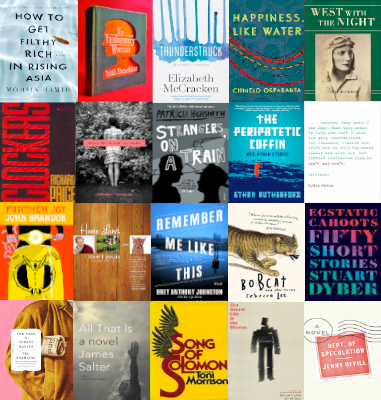Tick-tock, and another year rolls off the clock. We asked our staff here at American Short Fiction what they were reading in 2014. Words, words, words, they said, and proceeded to specify. Here, in no particular order, are some of our favorite lines of literature from the past year, with a few rediscovered oldies thrown in for good measure. The Germans have a saying they like to share around this time of year: Guten Rutsch, they say, which means, good slide, as in slip easily into the new year. Welcome to 2015. Here are some lovely words to smooth the way.
“The soul is liquid, and slow to evaporate. The body’s a bucket and liable to slosh. Grieving, haunted, heartbroken, obsessed: your friends will tell you to cheer up. What they really mean is dry up. But it isn’t a matter of will. Only time and light will do the job.
Who wants to, anyhow?”
—Elizabeth McCracken, “Something Amazing,” Thunderstruck and Other Stories
“And she comes to you, and she does not speak, and the others do not notice her, and she takes your hand, and you ready yourself to die, eyes open, aware this is all an illusion, a last aroma cast up by the chemical stew that is your brain, and will soon cease to function, and there will be nothing, and you are ready, ready to die well, ready to die like a man, like a woman, like a human, for despite all else you have loved, you have loved your father and your mother and your brother and your sister and your son and, yes, your ex-wife, and you have loved the pretty girl, and you have been beyond yourself, and so you have courage, and you have dignity, and you have calmness in the face of terror, and awe, and the pretty girl holds your hand, and you contain her, and this book, and me writing it, and I too contain you, who may not yet even been born, you inside me inside you, though not in a creepy way, and so may you, may I, may we, so may all of us confront the end.”
—Mohsin Hamid, How to Get Filthy Rich in Rising Asia
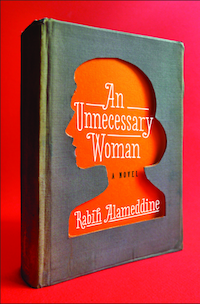 “Childhood is played out to us in a foreign language and our memory of it is a Constance Garnett translation”
“Childhood is played out to us in a foreign language and our memory of it is a Constance Garnett translation”
—Rabih Alameddine, An Unnecessary Woman
“I spent several minutes in deep concentration trying to get the picture fixed, to spot clues that would give me some exact sense of when and where, but the edges kept blurring. Sometimes I have trouble finding the edges.”
—John Darnielle, Wolf in a White Van
“There were shadows from the trees that Mira had not noticed until now. For a moment they offered up something wise and obvious to her, but what?”
—Anthony Varallo, Think of Me and I’ll Know
“His mother had the best-looking legs he had ever seen on anyone, no matter what age.”
—Patricia Highsmith, Strangers on a Train
“Rocco moved to the freezer for reinforcements. Desperate both to be there and be gone, he took out a cold quarter of Stoli and positioned the ice cream so he could read the Breyer’s Pledge on the side of the carton. Raising the bottle to his mouth, he held up his left hand, palm out, as if taking an oath. He let down a thin steady stream of vodka for as long as it took to read the Declaration of Purity, all the bullshit about fresh milk and vanilla beans, from beginning to end.”
—Richard Price, Clockers
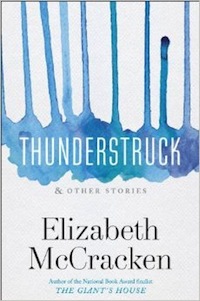 “She looked like the plump-cheeked naughty heroine of a German children’s book who’d just sawed off her own braids with a knife, looking for the next knifeable place.”
“She looked like the plump-cheeked naughty heroine of a German children’s book who’d just sawed off her own braids with a knife, looking for the next knifeable place.”
—Elizabeth McCracken, “Property,” Thunderstruck and Other Stories
“I tell her there’s wildlife right outside the window, and it’s true– a tall white bird is out there in the drizzle, stabbing the soft ground with more urgency than seems necessary. The bird is in the rough and beyond the bird is the fairway. Beyond that, peering out from screened lanais, are pairs of dismayed old folks. They promised themselves they’d die in lovely weather, and now that they’re here it’s just raining and raining and raining.”
—John Brandon, “Naples. Not Italy.” Further Joy
“My great-great-grandfather was a horse thief in the Ukraine. So his son could run numbers in the Bronx. So his son could go legit with liquor stores in Queens. So his son could build bars, catering halls, in New Jersey. So his son could be a busboy for his father? Was there supposed to be a glorious continuum to all this striving? I guess somebody had to break the glorious continuum chain.”
—Sam Lipsyte. Homeland
“I never told this to anyone, but maybe someday you’ll understand, if you’re lucky enough to meet someone who’ll make you feel as if your heart is wearing a tuxedo, as if your soul is standing in a chapel in the moonlight and your life is rushing like a limo running red lights, you’ll understand how one day you open your eyes and it’s as if you find yourself standing on the top of a wedding cake in the middle of the road, an empty highway, without a clue as to how you got there, but then, that’s all part of coming out of nowhere, isn’t it?”
—Stuart Dybek, “I Never Told This to Anyone,” Ecstatic Cahoots
 “Under all this dirt / the floor is really very clean.”
“Under all this dirt / the floor is really very clean.”
—Lydia Davis, “Housekeeping Observation,” Can’t and Won’t
“Watching it burn I am at last depressed. I make it a symbol of my despair, only because it is not brighter, perhaps because it cannot talk.”
—Beryl Markham, West with the Night
“If I had to sum up what he did to me, I’d say it was this: he made me sing along to all the bad songs on the radio. Both when he loved me and when he didn’t.”
—Jenny Offill, Department of Speculation
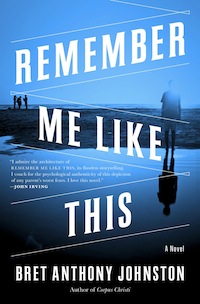 “Laura said, ‘Dolphins never sleep, not fully. They’re always at least half awake. Each side of their brain sleeps at different times.’
“Laura said, ‘Dolphins never sleep, not fully. They’re always at least half awake. Each side of their brain sleeps at different times.’
‘Because they’re afraid?’
‘No,’ she said sweetly, proudly, taking his hand and rolling into his arm like a blanket. ‘Because they’re smart.'”
—Bret Anthony Johnston, Remember Me Like This
“How can you deny your own mother, her cruelties and desperations and beauties floating in you like toy boats?”
—J.M. Tyree & Michael McGriff, Our Secret Life in the Movies
“Milkman ducked under the boughs of the black walnut trees and walked straight toward the big crumbling house. He knew that an old woman had lived in it once, but he saw no signs of life there now. He was oblivious to the universe of wood life that did live there in layers of ivy grown so thick he could have sunk his arm in it up to the elbow. Life that crawled, life that slunk and crept and never closed its eyes. Life that burrowed and scurried, and life so still it was indistinguishable from the ivy stems on which it lay. Birth, life, and death—each took place on the hidden side of a leaf. From where he stood, the house looked as if it had been eaten by a galloping disease, the sores of which were dark and fluid.”
— Toni Morrison, Song of Solomon
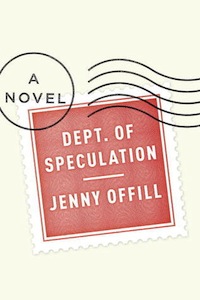 “People keep telling me to do yoga. I tried it once at the place down the street. They only part I liked was the part at the end when the teacher covered you with a blanket and you got to pretend you were dead for ten minutes.”
“People keep telling me to do yoga. I tried it once at the place down the street. They only part I liked was the part at the end when the teacher covered you with a blanket and you got to pretend you were dead for ten minutes.”
—Jenny Offill, Department of Speculation
“They had travelled for ten days and he felt he knew her, in the room he knew her, at least most of the time, and also sitting at the chestnut-colored bar of the hotel, but you could not know someone else all of the time, their thoughts, about which it was useless to ask.”
— James Salter, All That Is
“Through the slats of the blinds, the gray industrial compost of Bridgeport Harbor that she could see was always there to remind her: this was a bankrupt city on every level, littered with dormant factory chutes and docks that had rotted to their stanchions; the red-and-white smokestack of an outdated coal plant standing like the shaft of a giant, filthy candy cane. Even the new single-A ball field and college hockey arena—built for the Volvo drivers and the Volvo drivers’ money—did nothing more than ensure that the only jobs available in the port of this city’s name were behind a concession stand.”
— Ted Thompson, The Land of Steady Habits
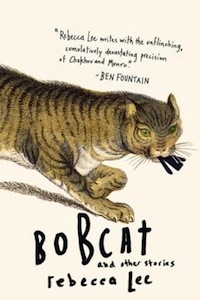 “The night was soft and warm. We walked through the tiny town, wandered its thin river. We ate burgers. He spoke of Moscow, where he had lived that summer. I had spend my childhood with a vision of Russia as an anti-America, a sort of fairy-tale intellectual prison. But this was 1987, the beginning of perestroika, of glasnost, and views of Russia were changing. Television showed a country of rain and difficulty and great humility, and Gorbachev was always bowing to sign something or other, his head bearing a mysterious stain shaped like a continent one could almost but not quite identify.”
“The night was soft and warm. We walked through the tiny town, wandered its thin river. We ate burgers. He spoke of Moscow, where he had lived that summer. I had spend my childhood with a vision of Russia as an anti-America, a sort of fairy-tale intellectual prison. But this was 1987, the beginning of perestroika, of glasnost, and views of Russia were changing. Television showed a country of rain and difficulty and great humility, and Gorbachev was always bowing to sign something or other, his head bearing a mysterious stain shaped like a continent one could almost but not quite identify.”
— Rebecca Lee, “The Banks of the Vistula,” Bobcat
“Weeks pass and here’s how the boys talk to each other: What do you like? What do you like? Is that something we should like? Every day is a disputation of taste, and nothing ascends without the explicit approval of both. When they wrestle, one wins. The next time they wrestle, the other wins.”
— Ethan Rutherford, “Summer Boys,” The Peripatetic Coffin
 “A prickly heat appeared to have radiated up her face by then, rendering her cheeks red. All that fervent shaking. I observed the heat on her face, and I seemed to absorb it from her: first, I felt it in the soles of my feet, and then it crept up to my thighs. It was the strongest in my groin, and then in my chest. From my chest, it radiated up to my face. It was then that I understood. That there was something else to it.”
“A prickly heat appeared to have radiated up her face by then, rendering her cheeks red. All that fervent shaking. I observed the heat on her face, and I seemed to absorb it from her: first, I felt it in the soles of my feet, and then it crept up to my thighs. It was the strongest in my groin, and then in my chest. From my chest, it radiated up to my face. It was then that I understood. That there was something else to it.”
—Chinelo Okparanta, “Designs,” Happiness, Like Water
